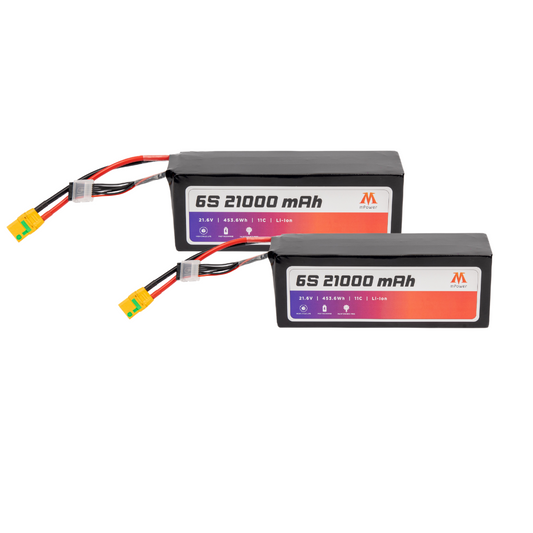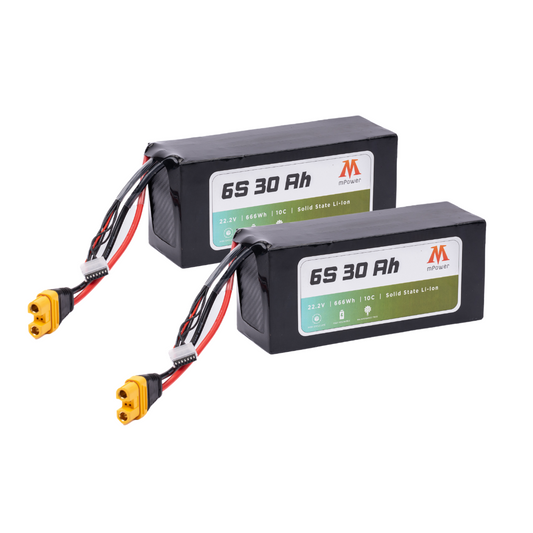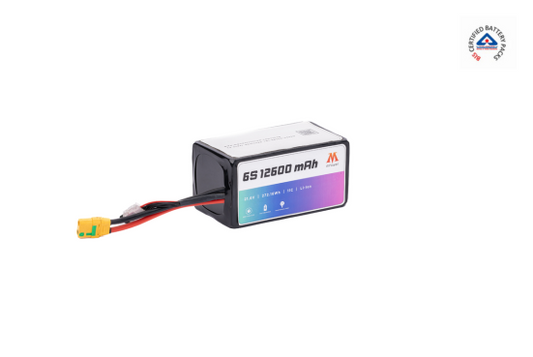
The world of drones is experiencing a constant buzz of innovation, with new capabilities and applications emerging seemingly daily. But amidst the innovation, drone enthusiasts and users must stay informed about the ever-evolving regulatory landscape. These regulations can impact everything from where you can fly your drone to the type of battery you can use.
To navigate these changes smoothly and continue exploring the aerial frontier, here are some key steps you can take. First and foremost, understanding how to choose the right battery for your drone is essential. The battery's capacity, voltage, and discharge rate all play a crucial role in flight time, power, and safety. By familiarizing yourself with these factors and staying updated on regulatory changes that might affect battery options; you can ensure a safe and enjoyable drone flying experience.
Choosing reliable options like mPower batteries is essential for maintaining compliance with regulations and maximizing the performance of your drone. mPower batteries are renowned for their reliability and adherence to industry standards. By opting for these trusted power sources, you can ensure that your drone operates smoothly while meeting all regulatory requirements.
This guide will equip you with the knowledge you need to stay ahead of the curve, including how to choose a battery for drone in compliance with evolving regulations.
Essential Steps for Selection of Drone Battery
When selecting a battery for your device, it's crucial to understand the various options available:
LiPo (Lithium Polymer) batteries: These batteries are renowned for their exceptional energy density and lightweight characteristics. However, it's worth noting that LiPo batteries rely on traditional power generation technology, which has been in use for quite some time now. Their performance is still quite impressive.
Li-ion (Lithium-Ion) batteries: Being a component of advanced and futuristic technology, it is widely used in many consumer electronics. Li-ion batteries offer a good balance between energy density and weight, making them suitable for a wide range of applications.
Solid State Battery: Solid-state batteries for drones offer enhanced safety, higher energy density, and a longer lifespan. These cutting-edge batteries minimize the risk of overheating and deliver greater efficiency, which translates to extended flight times. It is more popular for agriculture-based operations.
By understanding the characteristics and advantages of each battery type, you can make an informed decision on which is best suited for your specific needs. At mPower, we offer a selection of top-tier battery types tailored for drones, ensuring optimal performance and reliability.
To optimize your flight experience, consider selecting a battery with a higher mAh (milliampere-hour) rating for extended flight durations. However, it's essential to balance capacity and weight, as heavier batteries may compromise overall flight efficiency. A well-chosen battery can significantly enhance your drone's performance, allowing for longer, more enjoyable flying sessions.
Ensuring that the battery voltage aligns with your drone's specified requirements is crucial. Using an incorrect voltage can damage the drone's electronics and severely impair performance. Always double-check voltage specifications before use to maintain your drone's optimal functionality and safety. For optimum performance, select mPower efficient batteries.
Maximize Your Drone Experience: Staying Ahead of Regulatory Shifts
Keep yourself updated by frequently checking for updates from national aviation authorities like the DGCA or Drone Rules 2021. These organizations are pivotal in providing the latest information and guidelines.
Understanding the no-fly zones, altitude limits, and operational restrictions is essential for safe and responsible drone use. Identify areas where drone flights are prohibited and adhere to the stipulated altitude limits and other operational guidelines to maintain safety and legality.
It is crucial to register your drone with the appropriate authorities to ensure smooth operations and adherence to legal standards. Failing to do so could result in hefty fines or the suspension of your drone activities. Registering your drone not only legitimizes your drone activities but also enhances your credibility as a responsible operator.
Connect with top-tier professionals and seasoned legal experts in the drone industry. Gain invaluable advice and insights from those adept at navigating the ever-evolving regulatory landscape. Expand your knowledge and build meaningful relationships with industry leaders.
Experience the advantage of networking with experts who understand the intricacies of regulatory changes and can guide your path to compliance and success.
Conclusion
In the fast-evolving landscape of drone technology, staying ahead of regulatory shifts is not just beneficial—it's essential. By understanding and adopting the key steps outlined in this guide, you can ensure that your drone-flying experience remains safe and compliant. Familiarizing yourself with different battery types, considering capacity and flight time, and ensuring proper voltage alignment are foundational elements for optimized drone performance. Knowing how to choose a battery for drone can significantly impact your flying experience and safety.
Moreover, with the high-quality drone battery from mPower, you can significantly enhance the efficiency of your equipment. Our professional-grade batteries are designed to deliver optimal performance and longer flight times for your drones. Don't compromise on power - choose mPower for reliable and efficient drone operations.
Explore our range of premium drone batteries that will take your aerial photography and videography to new heights!












